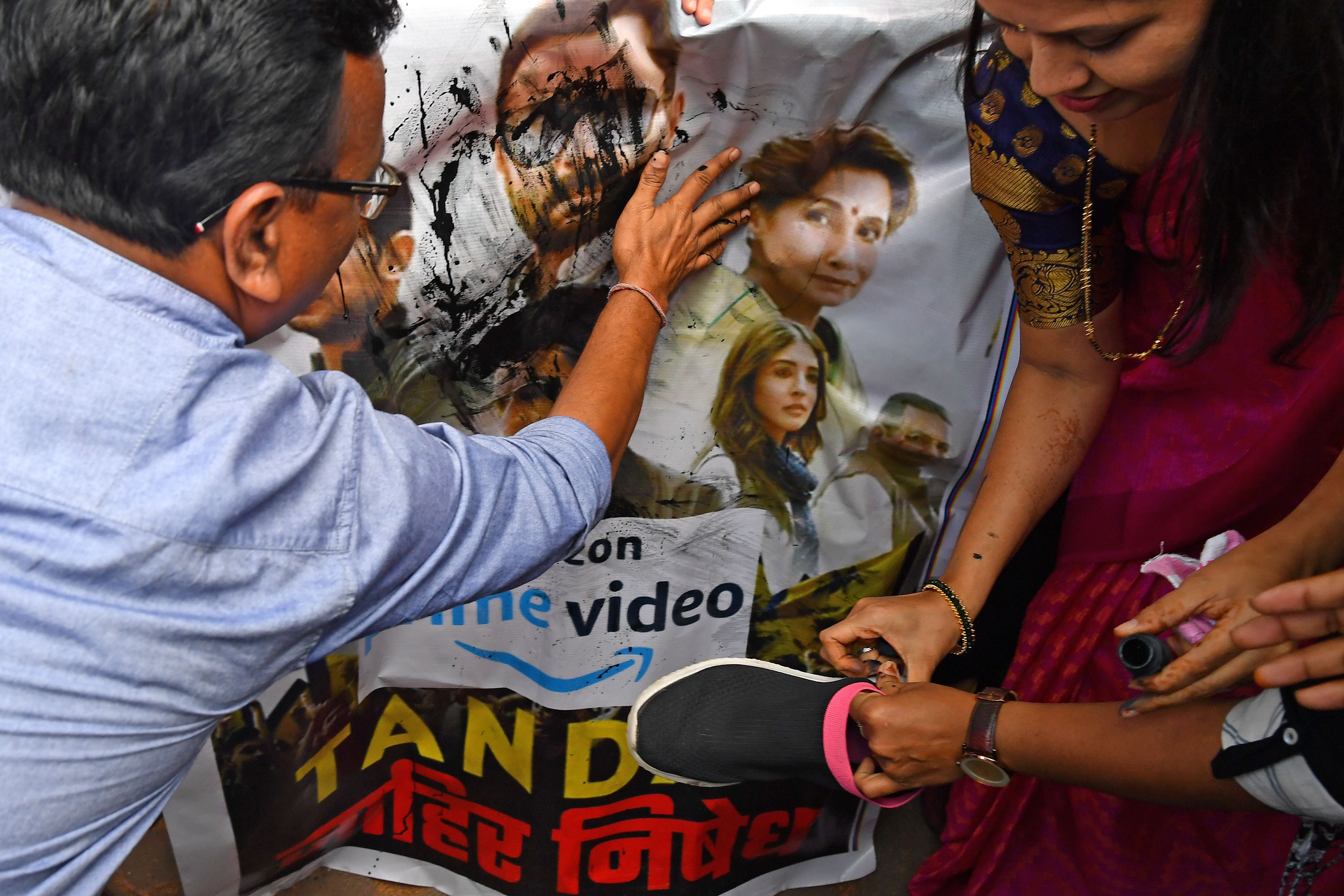Bollywood gripped by fear amid creeping religious censorship on films
Content creators who sell the big dream to millions are torn between fright at recent developments and wistful optimism, as Rituparna Chatterjee reports


There’s palpable unease among the actors and artistes of Bollywood, one of the world’s largest film industries, as recent examples of religious censorship have forced filmmakers to apologise for their content or face reprisals that can range from online boycott calls to police action.
This week Amazon’s Prime Video streaming service had to issue an unconditional apology for scenes in the fictional drama seriesTandav that offended Hindus. The word Tandav translates as the dance of fury — a cosmic dance associated with deities, especially the Hindu god Shiva, who is also called Nataraja or the lord of dance.
The retail giant, with its $6.5bn investment in the country and an audience of 600 million that founder Jeff Bezos has hailed as one of its fastest growing markets, put out a statement saying it was “never their intention” to offend audiences in India.
“We respect our viewers’ diverse beliefs,” Amazon said. “We will continue to develop entertaining content with partners, while complying with the laws of India and respecting the diversity of culture and beliefs of our audiences.”
Amazon’s apology reflects the apprehensions of content creators in an industry that typically churns out more than 1,000 films a year. Industry insiders, speaking off the record for fear of a backlash, say scripts are being studied with a fine-toothed comb to remove potentially offensive material, and artists are afraid to state their concerns online fearing violence. Dread has gripped the industry, especially after India’s top court refused to grant interim protection from arrest to the Tandav cast and crew, stating that the right to freedom of speech was not absolute.
“You accepted the contract after reading the script... you cannot play the role of character that hurts the sentiments of a community,” the country’s Supreme Court said in rare comment that amounts to holding movie actors liable for the roles they portray.
In interviews with The Independent, Bollywood’s content creators speak about the future of creative art, walking the tightrope of religious sensibilities in a nation of billions deeply passionate about both cinema and religion – where, for many, cinema is religion.
“In general, [the] atmosphere is not good. It could have been a better, but it is whatever it is,” says the actor Sushant Singh, the star of The Legend of Bhagat Singh and an outspoken figure on social media.
“As far as creativity is concerned, I often give the example of Iranian cinema. That country has seen extreme censorship... and yet (Iranian filmmakers) managed to produce some of the most beautiful human stories. Creativity always finds an outlet.”
Calling the censorship of Tandav “sad”, he says: “You cannot throttle creativity under rules... What will you do? You will cut off the internet of the whole country? In today’s world... joined by the internet and social media, it's really impossible to control the narrative to suit only your agenda.”
The backlash against Tandav began with online calls for a boycott in mid-January after a scene that starred Muslim actor Mohammed Zeeshan Ayyub dressed as the Hindu deity Shiva. Hindus, including politicians, parliamentarians and religious activists, demanded that the show be held accountable for its content.
Ayyub portrayed a modern version of Shiva, wearing a blazer, T-shirt, trousers and blue face paint, in a college play. What most offended devout Hindus were a few lines of dialogue, where he is seen discussing ways to increase his social media following to compete with Lord Rama, another beloved deity.
Bollywood has traditionally been seen as rising above any religious divides in the country, with big-ticket films carrying messages of secularism and unity and many of its biggest stars being Muslims who routinely play Hindu characters. Lately though, there have been rising concerns about the targeting of minorities in creative fields for criticising the state.
Criminal complaints were lodged in several states against Tandav’s director Ali Abbas Zafar, writer Gaurav Solanki, and actors Saif Ali Khan and Ayyub and within days the cast and crew of the series scrambled to apologise.
The outrage included senior politicians from the ruling Hindu nationalist BJP party, with Madhya Pradesh’s chief minister Shivraj Singh Chouhan tweeting to say that no one had the right to hurt the feelings of Hindus.
Police complaints over the series were filed in six states, including Uttar Pradesh – another highly populous province led by the BJP. But what was perhaps most remarkable was the ruling from the Supreme Court that refused to grant those involved in making the series any kind of protection from arrest.
“Almost all involved in the show have read the script and signed the contract! Let’s arrest the whole cast and crew?” tweeted actor Konkona Sensharma after the Supreme Court’s order.
An actor associated with Tandav declined to be interviewed for this article, but another industry insider says those who regularly lambast Bollywood stars for not speaking up on issues of human rights – unlike their American counterparts, for instance – have no idea what the reality was like.
“Look at what is happening to people (in Bollywood). They have been hounded and there have been multiple police complaints which seem to be the modus operandi. People say a blanket thing like Bollywood doesn’t have a spine, but our spine is lathi (police baton) charged and broken and bloody,” says the insider, who asked to speak on condition of anonymity for fear of reprisals.
“Your outside world really doesn’t know, but the industry is in such a big mess right now because of this whole thing. Even stating that, we are afraid, makes us a target. So what does one do?” he asks.
“Look at the larger repercussions of it, which is not only contained to a particular scene being OK or not, or a particular film or a TV show, it is the universal fear that has gripped all of Bollywood right now. Basically, we’ve been told that we cannot show society the way it is. Because society is a clear function of state, and you cannot talk about the state,” he says.
Actor Gulshan Devaiah, star of films including Shaitan and Hate Story, acknowledges that despite the comparisons between now and Indira Gandhi’s state of emergency imposed in the Seventies, when many civil rights were suspended, censorship of cinema is neither new in India nor exclusive to any particular political party.
That doesn’t mean he’s not worried by the current atmosphere.
“I’ll admit it. I’m scared,” he says. “I don’t know what I’m going to do. But I don’t want to be afraid. As actors... a lot of us don’t have the luxury to break contracts, because we are all trying to make an honest living. I mean, I love what I do. And it’s also unprofessional to back out of a project,” he says, referring to the court’s observation about scripts and the dilemma actors face.
“If the cracking of the whip is meant to scare, I’m scared. I don’t know what it really means to me after this, in the sense of how I’m going to respond to future scripts, how I’m going to be reading them...”
Indian television actor Nakuul Mehta says that despite everything, he is “quite optimistic about the state of our democracy” and that there is still space for differing views expressed in the visual arts.
“What else is art but speaking through your work about the times you lived in... As an artist, if I feel there is any injustice that I can highlight through my art, then I will definitely do it,” he says.
“My interpretation of injustice may differ from the government of the day or even the judiciary, but we live in a democracy and have been granted reasonable freedom of expression by our constitutional fathers, so I’d rather use it to participate in the dialogue than stay quiet fearing a ‘vindictive government’ or a ‘not so robust’ judiciary. Dissent is after all a part of democracy.”
Devaiah says he’s not seen Tandav. “So I don't know the context. [But] it personally disturbed me because there was an actor who was trying to defend himself (in court). That I can feel – an empathy for a fellow actor. I also feel that freedom is not absolute. I think there is a certain degree of social responsibility that is definitely attached to freedom,” he says.
“I guess Mohammad Zeeshan will have to clear himself on his own. And my empathy is to him as an actor. But I really don’t know. I mean, I could be in that position. Anybody could be in that position,” he says. “But I’m also afraid to say this out loud, because I don’t want to perpetuate this fear as well.”




Join our commenting forum
Join thought-provoking conversations, follow other Independent readers and see their replies
Comments